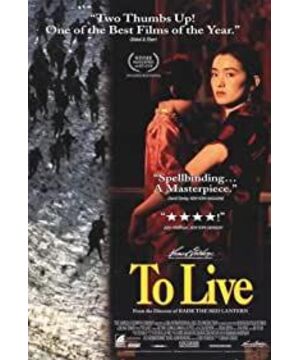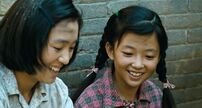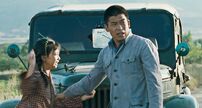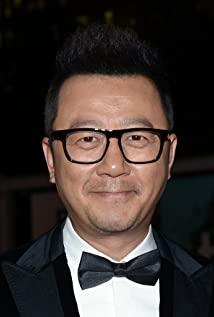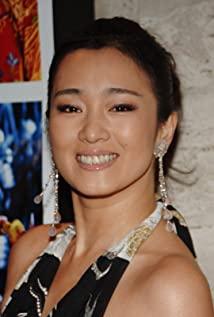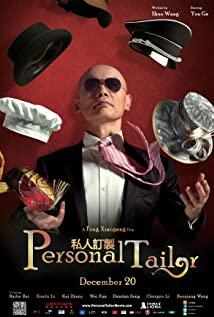People are alive, like grass growing from the dark cracks thinking of the sun's rays. The film started in a casino in the 1940s, when people could still gamble and enjoy shadow puppets. And the hero of the story... His name is Xu Fugui, and he is gambling with Long Er, just like everyone else. But he lost almost every time, and finally lost their splendid house. His elderly father was also pissed off; and his pregnant wife (Jia Zhen), seeing that he could never quit gambling, took his daughter back to his parents' house. The destitute Fugui had no choice but to buy things on the street. In short, the beginning of the film is very tragic... When I saw this time, I began to hate Fugui, and felt that he was so unsatisfactory as a family man, and he was so fierce to his wife, it was outrageous! But seeing his tragic situation, it is not that he feels pity for him. A year later, Jiazhen, who gave birth to a son (Youqing), returned with her daughter. Fugui also changed his face and stopped gambling. He even borrowed a set of shadow puppets from Long Er to make money. On this day, they were playing shadow puppets when they were confused and kidnapped by soldiers in the civil war between the Kuomintang and the Communist Party. In the cold winter, on the battlefield, he saw and witnessed countless soldiers who were wounded and finally froze to death. He asked a soldier: "Why don't you heal them?" The soldier replied: "We have hundreds of thousands of people surrounded by the People's Liberation Army, who can control them." Then he told Fugui: "We can't escape, the bullets won't last long by then. Eyes, let's wait for the PLA to come, and then we can live with our hands raised. I heard that they treat the prisoners very well, and they will give you money to go home." At that time, Fugui and Chunsheng (who were tied together) felt that they Did not return alive. Chunsheng said, "It would be great if I could or go back." Fugui said, "If I can go back alive, I must live a good life." These two lines of dialogue moved me very much, probably because a former big gambler was so solemn. Making a positive oath makes me feel that he is sincere in his decision to live a good life.
In the end, as the soldier said, they were indeed captured by the Communists. Chunsheng goes to drive his dream car; and Fugui also goes home. And the soldier was killed by a bullet without eyes when he was looking for his brother in the corpse.
It was late at night, and Fugui was walking down the street when he saw a girl collecting the thermos and the money at the door of each house. Taking a closer look, he found that it was his daughter Fengxia. It turned out that Jiazhen started a business of boiling water for the whole village to support her family. Jiazhen told Fugui that Fengxia had burnt her throat during a high fever and became mute; and his mother was already dead, and she didn't close her eyes when she died. Worse than the main character.
In the 1950s, the country had just been founded. Chairman Mao asked everyone to donate all the iron in the family, and use the chain iron as satellites; he began to divide the components, and Long Er was divided into landlords because of the large house. When he wanted to collect his house, he disagreed and beat the government. He was labelled a reactionary, pulled out of the city and shot with five bullets. Fugui said to Jiazhen, "Fortunately, this house lost to Long Er at that time, otherwise the five bullets would have hit me!" Maybe it was "everything is the best arrangement".
Fugui didn't rejoice for a long time, but another accident happened: the district chief (Chunsheng) wanted to teach the school children to learn chain iron, but he didn't stop the car when he stopped, and hit half of the school wall, and half of the wall fell asleep. On Qing, he died. In this scene where the father saw the bloody corpse of the child, Ge You handled it very well: twitching expressions, some vague words... no very deliberate tears and roars.
At the funeral, Chunsheng gives Fugui money, hoping they will forgive him. This is obviously too ridiculous, how can a living human life be compared to two hundred yuan. Fengxia thought so too. She said to Chunsheng, "I don't want your money, you pay my son back." When Chunsheng finally left, she shouted, "Remember, you owe our family a life..."
In the 1960s, it had been twenty years since the film started. The Cultural Revolution broke the four olds. Fugui's shadow puppets were burned, because those characters were all former gods, generals, etc. Fugui didn't want to, but he couldn't stop it—yes, in those red years, who would dare to fight against the Communist Party and the progress of the new China? I feel that after the shadow puppet was burned, some beliefs and memories in Fugui's heart were completely destroyed and disappeared. Since then, he has truly understood and seen what the world is now. I also realize how little people in the context of big times live to the light of the sun.
Near the end, it's almost the climax. Fengxia is married to Wan Erxi, a working class man. Legs are lame because of business. I think Jiang Wu's acting is quite similar: not only the lame foot is inside the eight, but the shoulders are still high and low. But ah, this cripple looks neither pitiful nor disgusting, but looks very honest and a little handsome!
During Fengxia's pregnancy, both Chunsheng and the town mayor were classified as capitalist roaders. Chunsheng's wife committed suicide, and he didn't want to live anymore. At this time, Fengxia came out and said to him, "You still owe us a life, and you must live." This sentence was different from the last time she said it: last time, I wished that he would die there on the spot. But this time, she also realized that it was not easy for others to let go of her previous hatred.
The impact of the penultimate scene is the greatest, gathering tension, laughter, lightness and sadness. It was like this: Fengxia was about to give birth, but the doctor was locked in the cowshed, leaving only some young, inexperienced nurses. Jiazhen is worried and asks Erxi to find a doctor. So Erxi took the doctor out of the cowshed in the name of criticizing and fighting. But the doctor hadn't eaten for three days and was so hungry that he ate all the seven steamed buns that Fugui bought him, and almost choked to death. Fugui gave him a lot of water again... Just when I was in a hurry to get the doctor to get better soon, and went to see Fengxia, the nurse suddenly said that she was born! It's a seven-pound boy, but my whole body is relaxed! Because the movie has always been miserable, miserable, miserable. Suddenly a happy event came and I couldn't stand it. Then... I really couldn't take it anymore, the nurse said that the mother was bleeding heavily; and the steamed buns in the doctor's stomach swelled several times after encountering the water, and he didn't know whether he was alive or dead. In the end, Fengxia also died. In this scene, Gong Li played a three-pointer. She was only twenty-nine at the time, but she really acted like a mother in her forties who had lost her daughter. I found that when she was really into the show and her performance was reasonable, the audience would not care whether she cried well or not, because we were completely infected by her performance.
The second time I went to the grave, I was much calmer than the first time. Maybe the older a person is, the less he sees the unhappiness of life, and adapts to the disasters that life brings.
The last scene before the end of the film is in stark contrast to the hospital scene: the family sits and eats together, which gives me a very calm and peaceful feeling, like spring after winter. The film "Alive" tells the stories of small people in the background of the big era, their ups and downs, and their various forms of life. Although many times I feel like I can't live anymore, but people can really grow from the cracks in the direction of the sun. Just like what Fugui said to his son: "Chicken grows up and becomes goose, goose grows up and becomes sheep, sheep grows up and becomes cow, cow grows up and becomes Communist Party" life will get better and better , live.
View more about To Live reviews


